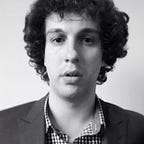Beep Beep: The History of George Laurer and the Barcode
How a 67-cent pack of Juicy Fruit, and a guy who said no, changed the way we shopped
Author’s note: This story was initially reported in 2014 but was not published. It’s released here today in memory of George Laurer, who died on December 10, 2019 at the age of 94.
 Forty-five years ago Clyde Dawson handed over a 10-pack of Wrigley’s Juicy Fruit chewing gum to checkout clerk Sharon Buchanan in the Marsh Supermarket in Troy, Ohio. It was 8 a.m. and Dawson wasn’t any ordinary shopper — he was Marsh’s director of research and development — and this wasn’t any ordinary transaction.
Forty-five years ago Clyde Dawson handed over a 10-pack of Wrigley’s Juicy Fruit chewing gum to checkout clerk Sharon Buchanan in the Marsh Supermarket in Troy, Ohio. It was 8 a.m. and Dawson wasn’t any ordinary shopper — he was Marsh’s director of research and development — and this wasn’t any ordinary transaction.
History was made, and it cost 67 cents.
This was the first time the Universal Product Code (UPC) barcode — the small black-and-white label we see on all the items we buy from stores — had been used in a commercial environment. Clyde Dawson was asked a year later whether he felt the implementation of barcode scanning in his stores was beneficial.
“Decidedly yes,” he said. “For a 14-item order, the manual system handles 45 customers per hour; the scanning system 51 — a 13% improvement in throughput.” It might not have been the most impassioned answer, but Dawson was prescient. Four decades on, barcodes dominate our lives…
